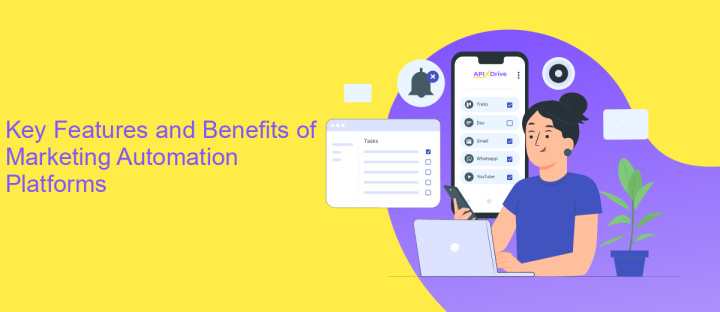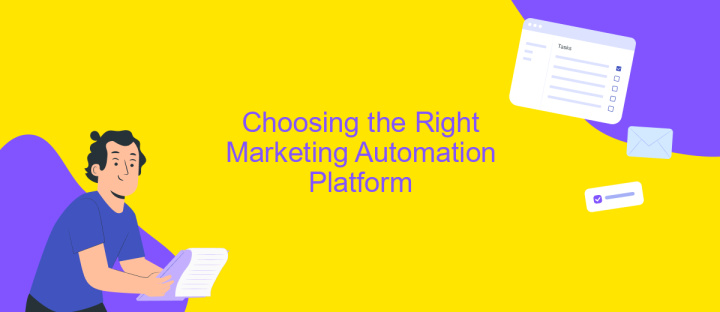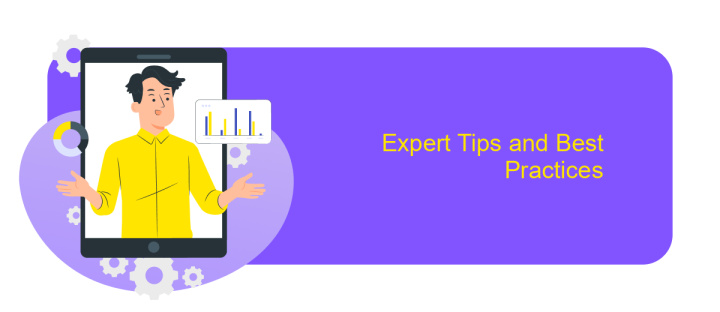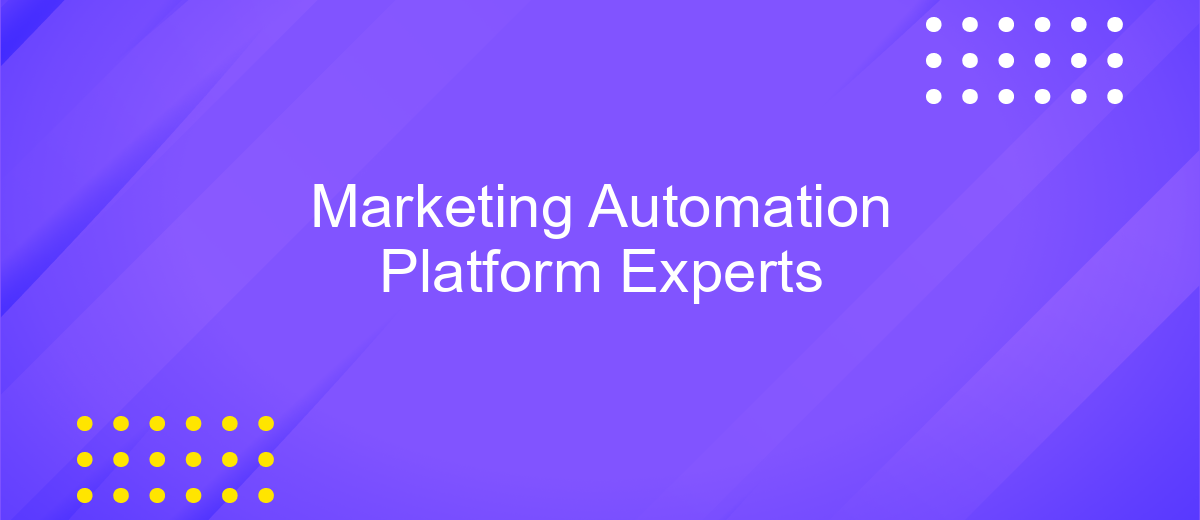Marketing Automation Platform Experts
In today's rapidly evolving digital landscape, businesses are increasingly turning to marketing automation platforms to streamline their operations and enhance customer engagement. As experts in this field, we delve into the intricacies of these platforms, providing insights and strategies to maximize their potential. This article explores the key features, benefits, and best practices for leveraging marketing automation to drive growth and efficiency in your organization.
Introduction
In the rapidly evolving digital landscape, businesses are increasingly turning to Marketing Automation Platforms (MAPs) to streamline their marketing efforts and maximize efficiency. These platforms empower organizations to automate repetitive tasks, personalize customer interactions, and gain valuable insights into consumer behavior. As companies strive to enhance their marketing strategies and achieve better results, the role of Marketing Automation Platform Experts becomes crucial. These professionals possess the expertise to navigate complex systems, ensuring that businesses harness the full potential of their chosen platforms.
- Understanding the nuances of various MAPs and selecting the right fit for business needs.
- Implementing and configuring platforms to align with marketing objectives and workflows.
- Analyzing data to optimize campaigns and improve return on investment (ROI).
- Ensuring seamless integration with existing systems and tools.
- Providing training and support to marketing teams for effective platform utilization.
With the demand for personalized and data-driven marketing growing, the expertise of MAP specialists is more valuable than ever. Their ability to leverage technology to foster customer engagement and drive growth makes them indispensable assets in the modern marketing ecosystem. As businesses continue to embrace digital transformation, the insights and skills offered by Marketing Automation Platform Experts will play a pivotal role in shaping successful marketing strategies.
Key Features and Benefits of Marketing Automation Platforms

Marketing automation platforms offer a suite of key features designed to streamline and enhance marketing efforts. These platforms enable businesses to automate repetitive tasks such as email marketing, social media posting, and ad campaigns, allowing marketing teams to focus on strategy and creativity. Advanced segmentation and targeting capabilities ensure that marketing messages reach the right audience at the right time, increasing engagement and conversion rates. Additionally, comprehensive analytics and reporting tools provide insights into campaign performance, enabling data-driven decision-making and continuous optimization.
One significant benefit of marketing automation platforms is their ability to integrate seamlessly with other business tools and systems. Services like ApiX-Drive facilitate these integrations, allowing businesses to connect their marketing automation platforms with CRM systems, e-commerce platforms, and more, without the need for extensive technical expertise. This connectivity enhances workflow efficiency and data consistency across the organization. Ultimately, marketing automation platforms empower businesses to deliver personalized customer experiences at scale, driving growth and improving ROI.
Choosing the Right Marketing Automation Platform

Choosing the right marketing automation platform is crucial for any business aiming to streamline its marketing efforts and enhance customer engagement. With numerous options available, making an informed decision requires careful consideration of specific factors that align with your business goals and needs.
- Identify Your Objectives: Clearly define what you want to achieve with a marketing automation platform, such as lead generation, customer retention, or increased sales.
- Evaluate Features: Compare the features offered by different platforms, including email marketing, social media integration, analytics, and CRM capabilities.
- Consider Scalability: Ensure the platform can grow with your business, accommodating more users, contacts, and data as your company expands.
- Assess User-Friendliness: A user-friendly interface is essential for efficient use, minimizing the learning curve for your team.
- Check Integration Options: Verify that the platform can easily integrate with your existing tools and systems, such as your CRM or e-commerce platform.
By taking these factors into account, you can select a marketing automation platform that not only meets your current needs but also supports your business's future growth. Making a strategic choice will empower your marketing team to operate more efficiently and effectively.
Expert Tips and Best Practices

Marketing automation platforms can significantly enhance your campaigns, but leveraging them effectively requires expertise. Understanding your audience and setting clear objectives are crucial first steps. Tailor your automation strategy to align with these goals, ensuring every automated action serves a purpose.
Data is the backbone of any successful marketing automation effort. Regularly clean and update your database to maintain data integrity and accuracy. This will enhance personalization, making your campaigns more relevant and impactful. Additionally, segment your audience effectively to deliver tailored content that resonates with each group.
- Continuously test and optimize your automation workflows.
- Leverage analytics to gain insights into consumer behavior.
- Integrate your platform with other tools for seamless operations.
- Stay updated with the latest trends and technologies in marketing automation.
Lastly, never underestimate the power of human oversight. While automation can handle repetitive tasks, human creativity and intuition are irreplaceable. Regularly review your strategies and make adjustments as needed to ensure your marketing efforts remain innovative and effective.
- Automate the work of an online store or landing
- Empower through integration
- Don't spend money on programmers and integrators
- Save time by automating routine tasks
Conclusion
In conclusion, the role of marketing automation platforms has become indispensable in today's fast-paced digital landscape. These platforms empower businesses to streamline their marketing efforts, enhance customer engagement, and drive measurable results. By automating repetitive tasks and personalizing customer interactions, companies can focus on strategic initiatives that foster growth and innovation. As businesses continue to embrace digital transformation, the demand for experts in marketing automation will only increase, making it crucial for professionals to stay updated with the latest tools and trends.
Integration capabilities are a significant factor in the success of marketing automation platforms. Services like ApiX-Drive offer seamless integration solutions that connect various applications, ensuring data flows smoothly across systems. This not only enhances operational efficiency but also provides a comprehensive view of customer interactions. By leveraging such integration services, businesses can optimize their marketing strategies and enhance decision-making processes. Ultimately, marketing automation platforms, coupled with robust integration solutions, are key to achieving a competitive edge in the market.
FAQ
What is a Marketing Automation Platform (MAP) and why is it important for businesses?
How can a business get started with implementing a Marketing Automation Platform?
What are some key features to look for in a Marketing Automation Platform?
How can businesses ensure successful integration of a Marketing Automation Platform with their existing systems?
What are the common challenges businesses face when using a Marketing Automation Platform, and how can they overcome them?
Apix-Drive is a simple and efficient system connector that will help you automate routine tasks and optimize business processes. You can save time and money, direct these resources to more important purposes. Test ApiX-Drive and make sure that this tool will relieve your employees and after 5 minutes of settings your business will start working faster.


